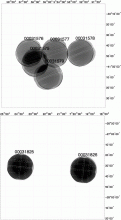
Abstract
We present the first multi-wavelength follow-up observations of two candidate gravitational-wave (GW) transient events recorded by LIGO and Virgo in their 2009-2010 science run. The events were selected with low latency by the network of GW detectors (within less than 10 minutes) and their candidate sky locations were observed by the Swift observatory (within 12 hr). Image transient detection was used to analyze the collected electromagnetic data, which were found to be consistent with background. Off-line analysis of the GW data alone has also established that the selected GW events show no evidence of an astrophysical origin; one of them is consistent with background and the other one was a test, part of a "blind injection challenge." With this work we demonstrate the feasibility of rapid follow-ups of GW transients and establish the sensitivity improvement joint electromagnetic and GW observations could bring. This is a first step toward an electromagnetic follow-up program in the regime of routine detections with the advanced GW instruments expected within this decade. In that regime, multi-wavelength observations will play a significant role in completing the astrophysical identification of GW sources. We present the methods and results from this first combined analysis and discuss its implications in terms of sensitivity for the present and future instruments.